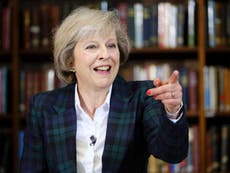When you cross-reference Theresa May's speech with her voting record, it's as if she didn't mean anything she said
May wants to stand up for the 'ordinary worker' and pull big business bonuses into line. I guess she forgot about the time she voted against creating jobs for young people using money from bankers' bonuses

It’s great news that Theresa May is our new Prime Minister, isn’t it? I for one felt really warm and fuzzy inside when she made her speech all about being the servant of working people, the protector of struggling young people, the defender of the employee against asset-stripping companies and big business meanies, and the champion of social mobility.
When she said, “it is apparent to anybody who is in touch with the real world that people do not feel our economy works [for everyone]” because it was “ordinary members of the public” who “made real sacrifices after the financial crash in 2008”, I completely forgot that, on 4 September 2013, she voted against calling on the government to get more people into work, against introducing a compulsory jobs guarantee, against standing up for families in the private rental sector, against curbing payday lenders, and against banking reforms.
“Taxes for the lowest paid went down, but other taxes, like VAT went up. Fixed items of spending – like energy bills – have rocketed,” May continued, as evidence of the crippling unfairness of the post-recession world, and it was wiped completely from my memory how she has consistently voted to raise VAT since 2010 and voted against acting on soaring energy bills in 2013.
“It’s harder than ever for young people to buy their own home,” I heard her say. “There is a growing divide between a more prosperous older generation and a struggling younger generation.” I guess it was probably a mistake when she voted, on 13 May 2014, not to ban estate agents from charging their fees to tenants instead of the person renting out the property, making young people who rent shoulder the financial burden rather than their older, richer buy-to-let landlords.
And since, in her own words, “housing matters so much” and “unless we deal with the housing deficit” and build more houses then we will end up with an unbalanced, unfair economy, she probably wouldn’t want me to bring up that she voted against building 100,000 affordable homes in 2013, at the same time as she voted against bringing forward long-term infrastructure investment.
You know what Theresa really believes in, though? “Doing something radical” about big business. She wants transparency on bonuses, “the full disclosure of bonus targets and the publication of ‘pay multiple’ data: that is, the ratio between the CEO's pay and the average company worker’s pay.” She wants to stand up for the little guy and have him sit on the company board. She wants to get sky-rocketing pay at the top quashed when it doesn’t benefit people at the bottom, because she’s basically the Robin Hood of corporation politics. Just don’t let on that you remember she voted, on 12 October 2011, against creating more jobs for young people funded by bank bonuses.
And that morally repugnant scheme she voted for in 2012? Now I think about it, it’s actually a really awesome radical financial plan for the youth – you remember the one, where employees could sell their rights (among them the right to redundancy pay and the right to not be unfairly dismissed from their jobs) for shares in the company they worked for. Because who needs employment rights anyway, in that increasingly insecure jobs market you just made a speech about, right Theresa? They’re sort of like a nice little extra you get sometimes, so why not sell them? Maybe we can get people to sell their human rights next too.
May’s going to be tough on tax evasion, though, that’s for sure. She put it in the strongest terms to really underline that commitment: “It doesn’t matter to me whether you’re Amazon or Google or Starbucks, you have a duty to put something back, you have a debt to your fellow citizens, you have a responsibility to pay your taxes,” she said earlier. “So as Prime Minister, I will crack down on individual and corporate tax avoidance and evasion.” Never mind that in April 2016 – mere weeks ago – she voted against implementing a series of proposals intended to reduce tax avoidance and evasion and against giving the Financial Conduct Authority and Prudential Regulation Authority duties to combat abusive tax avoidance arrangements. Never mind that.
Theresa May's voting records were accessed with permission from TheyWorkForYou.com



Join our commenting forum
Join thought-provoking conversations, follow other Independent readers and see their replies